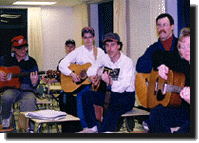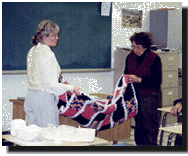
The Community School Movement on Prince Edward Island
is a unique initiative in Canada, seeking to combine
adult education and community development in an informal
atmosphere of fun and sociability. The movement was
initiated by the provincial government in the 1960s, in
recognition of the need for a program to rejuvenate the
Island’s rural communities.
The period after World War II brought development to most
areas of Canada but this urban, industrial development
had a negative impact on rural areas. The costs of farm
production began to outweigh the prices received for
agricultural products. Many farmers were forced to
abandon their traditional livelihood and left their
communities to find work elsewhere. School consolidation
during this time also signalled the loss of innumerable
one-room schoolhouses that had been the centre of the
Island’s small communities. In the light of these
economic and social difficulties, Swiss-born Rudi
Dallenbach was invited to the Island to explore
possibilities for rural development in Prince Edward
Island.
Dallenbach’s legacy of a network of community
schools across the province still persists today. During
the winter of 1965–1966, three pilot schools were
created in Tignish, Kensington, and Mount Stewart.
Sponsored by the Town’s Board of Trade, the
Kensington community school was the only pilot school to
survive the first decade of the movement (although
numerous others had been added to the network). The
second year saw a total of twelve schools and, by the
third year, there were twenty community schools active
across Prince Edward Island.
Originally, the purpose of these
classes was to provide an opportunity for informal
education and a chance to enliven dismal winter evenings
through drama, reading, debating, and lectures. It was
hoped that these activities would provide important
skills for future rural leaders. Community school
programs would enable them to participate better in
public affairs and self-improvement. Early popular
courses related to agriculture,  sewing, conversational
French, homemaking, farm accounting, oil painting, and
ballroom dancing. The courses were phenomenally
successful in overcoming people’s negative attitudes
toward education while fostering better relationships
between schools and the community. The nightly coffee
breaks were a wonderful opportunity to socialize with
one’s neighbours, and the closing banquets were a
festive opportunity to share with others the skills one
had learned.
sewing, conversational
French, homemaking, farm accounting, oil painting, and
ballroom dancing. The courses were phenomenally
successful in overcoming people’s negative attitudes
toward education while fostering better relationships
between schools and the community. The nightly coffee
breaks were a wonderful opportunity to socialize with
one’s neighbours, and the closing banquets were a
festive opportunity to share with others the skills one
had learned.
In its early years, the Community Schools were strictly
rural phenomena but, by 1973, they had sprouted in
Summerside and Charlottetown and their focus began to
expand from strictly skills-based activities to more
crafts and recreation. By this time, Community Schools
had ceased to be a means to achieve community
development. They had become an end in
themselves—important social and cultural
institutions to which Islanders across the province look
forward in the dreary days following the holiday season.
Many courses have retained their popularity over the
years. Art, drama, music, sewing, knitting, dancing, car
care, and gardening classes are guaranteed to fill a
classroom. Some classes have even been springboards for
community organizations. The Belfast Historical Society,
for example, grew out of  a
Community School history course. Increasingly, agencies
such as the Canadian Red Cross, St. John’s
Ambulance, U.P.E.I. Extension, and the provincial
Department of Agriculture are giving courses through the
Community Schools. Other new courses emerge according to
people’s interests. Lately, those Islanders
interested in taking a computer use or internet course at
their local community school have to arrive early on
registration day if they want a spot in the class.
a
Community School history course. Increasingly, agencies
such as the Canadian Red Cross, St. John’s
Ambulance, U.P.E.I. Extension, and the provincial
Department of Agriculture are giving courses through the
Community Schools. Other new courses emerge according to
people’s interests. Lately, those Islanders
interested in taking a computer use or internet course at
their local community school have to arrive early on
registration day if they want a spot in the class.

Church Groups | Youth Groups | Advocacy Groups
Recreation Groups |
Service Groups